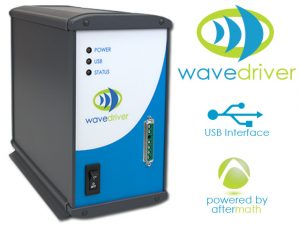The WaveDriver 10 is an affordable benchtop potentiostat/galvanostat system capable of performing a wide variety of traditional single working electrode methods. The WaveDriver 10 is a robust single channel potentiostat, with an impressive current range from ±100 nA up to ±1 A, advanced input, output, and waveform filters, and iR compensation. The WaveDriver 10 connects to your laptop or PC via a standard USB cable and is controlled by our power AfterMathTM Data Organizer software application. Rear panel connections allow rotation rate control when using rotating disk, cylinder, or ring-disk electrodes. Additional connections for analog input/output and synchronized timing permit the WaveDriver to be used in conjunction with other instruments.
Affordable. Take a look around at similar potentiostat/galvanostat systems and you will have a difficult time finding one with comparable specs and capabilities at the same modest price point. Pine Research strives to bring you cost-effective electrochemical instrumentation. The WaveDriver 10 also includes a four option dummy cell for calibration checking and instrument function testing, at no additional cost.
Versatile. Capable of performing up to 38 different techniques, the WaveDriver 10 is an all-around performer. It finds use in academic and industrial research around the world. Unlike many of its peers, the WaveDriver 10 was built to perform a little bit of everything and without added cost of different software “upgrades.”
Capable. Designed with the everyday user in mind, the specifications for the WaveDriver 10 potentiostat is broad enough to permit you to perform a wide range of routine electrochemical techniques but also prudently chosen to allow for a simple and affordable design. Popular and common techniques such as cyclic voltammetry, bulk electrolysis, differential pulse voltammetry, square wave and pulse voltammetry, battery charge/discharge sequences, corrosion-based analysis such as linear polarization resistance, chronoamperometry, and chronopotentiometry are easily configured and executed using our AfterMath software package.
[call_to_action color=”green” button_text=”Specifications” button_url=”https://devnewtheme.pineresearch.com/shop/knowledgebase/wavedriver-specifications/” button_icon=”link” button_icon_position=”right” layout=”vertical” target=”_blank”]All the details of your WaveDriver, in an easy location[/call_to_action]
[alert color = “red”] The WaveDriver Potentiostat / Galvanostat system is not designed for use in experiments involving human subjects and/or the use of electrodes inside or on the surface of the human body.[/alert]
[toggle title = “Electrode Connections”]
[columns]
[column width = “one-fourth”]
Cell Port
Reference Electrode
Counter Electrode
First Working Electrode
Second Working Electrode (WaveDriver 20 only)
[/column]
[column width = “three-fourths”]
combination coaxial DSUB connector (front panel)
sense line with driven shield
dive line
separate sense and drive lines, each with driven shield (current measurement via passive shunt)
separate sense and drive lines, each with driven shield (current measurement via passive shunt)
[/column]
[/columns]
[/toggle]
[toggle title = “Grounding”]
[columns]
[column width = “one-fourth”]
Signal Ground
Instrument Chassis
[/column]
[column width = “three-fourths”]
isolated from USB port, floats with respect to instrument chassis
banana binding post connection (back panel)
[/column]
[/columns]
[/toggle]
[toggle title = “Measured Current”]
[columns]
[column width = “one-fourth”]
Product Name
Practical Range§
Ranges
Resolution (at each range)
Autoranging
Accuracy
Leakage Current
ADC Input
Filter
[/column]
[column width = “three-fourths”]
WaveDriver
100 pA to 1.0 A
±1 A, ±100 mA, ±10 mA, ±1 mA, ±100 μA, ±10 μA, ±1 μA, ±100 nA
31.3 μA, 3.13 μA, 313 nA, 31.3 nA, 3.13 nA, 313 pA, 31.3 pA, 3.13 pA
Yes
± 0.2% setting; ±0.05% of range
10 pA at 25˚C
16 bits
10 Hz, 30 Hz, 100 Hz, 1 kHz, 10 kHz (2-pole, low pass Bessel filter)
[/column]
[/columns]
[/toggle]
[toggle title = “Applied Current (galvanostat mode)”]
[columns]
[column width = “one-fourth”]
Ranges
Resolution (at each range)
Accuracy
ADC Input
[/column]
[column width = “three-fourths”]
±1 A, ±100 mA, ±10 mA, ±1 mA, ±100 μA, ±10 μA, ±1 μA, ±100 nA
31.3 μA, 3.13 μA, 313 nA, 31.3 nA, 3.13 nA, 313 pA, 31.3 pA, 3.13 pA
± 0.2% setting; ±0.05% of range
16 bits
[/column]
[/columns]
[/toggle]
[toggle title = “Power Amplifier (counter electrode amplifier)”]
[columns]
[column width = “one-fourth”]
Output Current
Compliance Voltage
Speed
Bandwidth
Rise Time
[/column]
[column width = “three-fourths”]
±1.0 A (maximum)
> ±16.5 V
9 available speed settings
> 200 kHz (on fastest speed setting)
10 V/μsec (on fastest speed setting)
[/column]
[/columns]
[/toggle]
[toggle title = “Electrometer (reference electrode amplifier)”]
[columns]
[column width = “one-fourth”]
Input Impedance
Input Current
CMRR
Bandwidth
[/column]
[column width = “three-fourths”]
>10
13 Ω in parallel with < 10 pF
<10 pA leakage/bias current at 25˚C
> 84 dB at 0 to 1 kHz; > 74 dB at 10 kHz
> 11
MHz (3 dB)
[/column]
[/columns]
[/toggle]
[toggle title = “Applied Potential (potentiostat mode)”]
[columns]
[column width = “one-fourth”]
Ranges
Resolution (at each range)
Accuracy
DAC Output
CV Scan Rate (min)
CV Scan Rate (max)
[/column]
[column width = “three-fourths”]
±10.0 V, ±2.5 V
313 μV, 78 μV
± 0.2% setting, ± 1.0 mV
16 bits
10 μV/sec (313 μV per 31.3 sec or 78 μV per 7.8 sec)
125 V/sec (10 mV step per 80 μsec)
[/column]
[/columns]
[/toggle]
[toggle title = “Measured Potential”]
[columns]
[column width = “one-fourth”]
Ranges
Resolution (at each range)
Accuracy
ADC Input
Filter
[/column]
[column width = “three-fourths”]
±10.0 V, ±2.5 V
313 μV, 78 μV
± 0.2% setting; ±0.05% of range
16 bits
10 Hz, 30 Hz, 100 Hz, 1 kHz, 10 kHz (2-pole, low pass Bessel filter)
[/column]
[/columns]
[/toggle]
[toggle title = “Rotator Control Connections (back panel)”]
[columns]
[column width = “one-fourth”]
Rate Control Signal
Digital Enable Signal
Connector A
Connector B
[/column]
[column width = “three-fourths”]
±10.0 V, ±2.5 V
open drain (TTL compatible)
7-pin mini circular DIN includes analog and digital signal grounds, digital rotator enable signal, auxiliary digital output signal, and analog rotation rate control signal
3-pin connector includes analog signal ground, digital rotator enable signal, and analog rotation rate control signal
[/column]
[/columns]
[/toggle]
[toggle title = “Data Acquisition”]
[columns]
[column width = “one-fourth”]
Clock Resolution
Point Interval*
Synchronization
Raw Point Total
[/column]
[column width = “three-fourths”]
10 nsec (minimum time base)
80 μsec (minimum)
simultaneous sampling of all analog input signals
< 10 million per experiment
[/column]
[/columns]
[/toggle]
[toggle title = “Accessories”]
[columns]
[column width = “one-fourth”]
Universal Dummy Cell
Cell Cable
[/column]
[column width = “three-fourths”]
external dummy cell (included)
combination DSVB connector to multiple banana plugs via shielded coaxial cables (included)
[/column]
[/columns]
[/toggle]
[toggle title = “Auxiliary Connections (back panel)”]
| Connector C |
9-pin DSUB connector includes digital signal ground, two digital output signals, and three digital input signals |
| Trigger Input |
BNC female, TTL compatible |
| Trigger Output |
BNC female, TTL compatible |
| K1 Input, K2 Input |
BNC female, ±10 V differential input, 20 kΩ impedance, ±0.5% accuracy; allows external waveform to be summed directly to the working electrode excitation signal (K2 Input available only on WaveDriver 20 bipotentiostat) |
| Auxiliary Analog Output |
BNC female, ±10 V bipolar output, 313 μV resolution, 0.2% accuracy (available only when second working electrode not in use) |
| Auxiliary Analog Input |
BNC female, ±10 V differential input, 313 μV resolution, 20 kΩ impedance, 0.2% accuracy (available only when second working electrode not in use) |
[/toggle]
[toggle title = “General Specifications”]
[columns]
[column width = “one-fourth”]
Power Required
Power Adapter
Power Cable
LED Indicators
Instrument Dimensions
Instrument Weight
Shipping Dimensions
Shipping Weight
Temperature Range
Humidity Range
[/column]
[column width = “three-fourths”]
24.0 VDC (±5%), 4 A (low voltage DC device)
100 to 240 VAC, 2.3 A, 50 to 60 Hz
various international cables available separately (C13 type)
power, USB, and status
140 x 305 x 248 mm (5.5 x 12.0 x 9.75 in.)
3.6 kg (8 lb)
254 x 356 x 457 mm (10 x 14 x 18 in.)
7.7 kg (17 lb)
10˚C to 40˚C
80% RH Maximum, non-condensing
[/column]
[/columns]
*Data acquisition using the minimum point interval is possible for short duration bursts. The burst duration depends upon the available host PC USB bandwidth and is typically at least 3 seconds. §The “practical range” of measurable currents goes from the maximum current output of the amplifier down to the current level at which noise begins to interfere with the signal. Using proper grounding, a cell shielded by a Faraday cage and coaxial cell cables, it is possible to routinely measures signals as low as 100 pA.
[/toggle]
[call_to_action color=”violet” button_text=”Quick Start Guide” button_url=”https://devnewtheme.pineresearch.com/shop/knowledgebase/wavedriver-quickstart/” button_icon=”link” button_icon_position=”right” layout=”vertical” target=”_blank”]
Just purchased your WaveDriver? New user of the WaveDriver? Need a refresher? Review our Quick Start Guide.
[/call_to_action]
[call_to_action color=”black” button_text=”User Guide” button_url=”https://devnewtheme.pineresearch.com/shop/knowledgebase/wavedriver-userguide/” button_icon=”file-pdf-o” button_icon_position=”right” button_color=”red” layout=”vertical” target=”_blank”]
Get to know your WaveDriver. The user guide contains all the information you need about your new system. Download the PDF version of the User Guide.
[/call_to_action][call_to_action color=”green” button_text=”AfterMath Knowledgebase” button_url=”https://devnewtheme.pineresearch.com/shop/knowledgebase/aftermath/” button_icon=”link” button_icon_position=”right” layout=”vertical” target=”_blank”]
Questions about how to do something in AfterMath? Curious about what is asked in the parameters windows? Need to export or manipulate data?
[/call_to_action]
[call_to_action color=”blue” button_text=”Purchase” button_url=”https://devnewtheme.pineresearch.com/shop/products/potentiostats/bipotentiostats/wavedriver-10-main/” button_icon=”shopping-cart” button_icon_position=”left” layout=”vertical”]
The WaveDriver 10 is available in several product bundles. Purchase the bundle that best suits your needs.
[/call_to_action]


